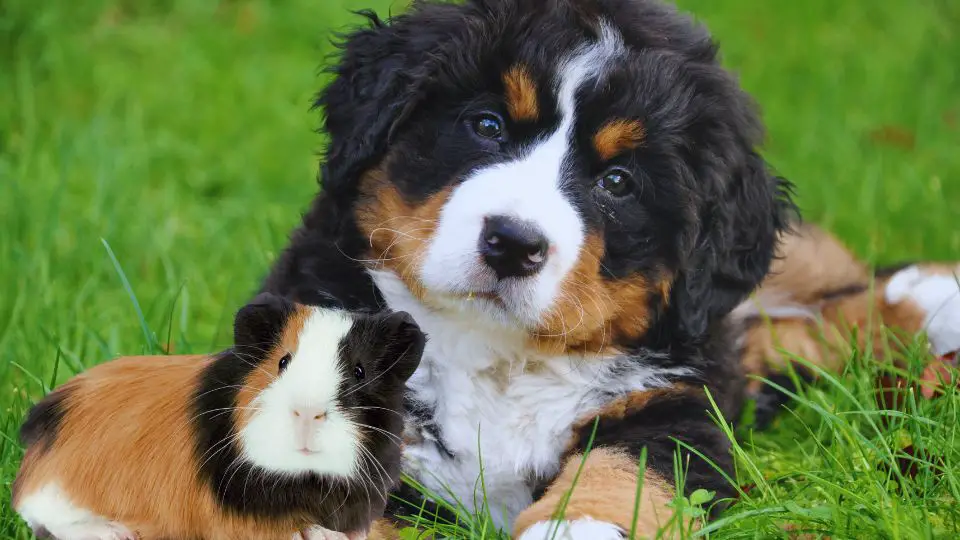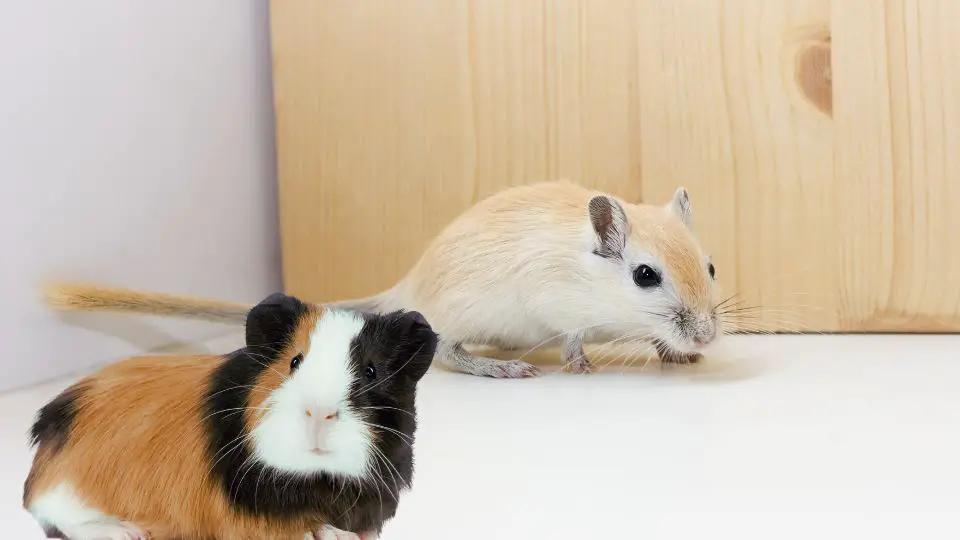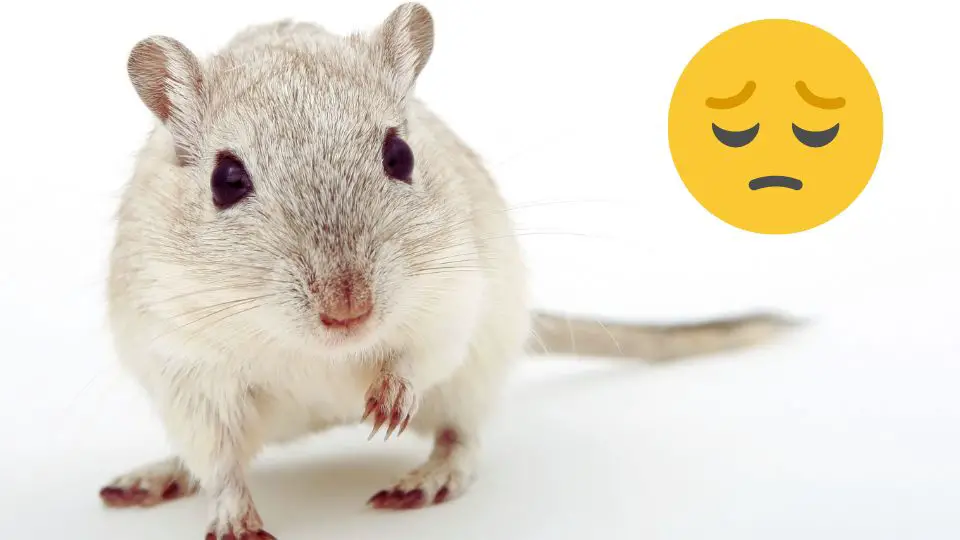Yes, gerbils teeth keep growing throughout their life. The most common reason a gerbil’s teeth keep growing is because they are open-rooted, so they develop new tooth tissue every day. This is similar to how fingernails grow outwards: they are constantly being regrown.
Gerbils use their teeth to gnaw on things like cardboard, wooden toys, and healthy snacks.
Do Gerbils Teeth Keep Growing?
Gerbils have a set of 16 teeth: 4 incisors and 12 molars. Gerbils teeth keep growing all throughout their life. This is because their teeth have open roots and incisors grow continuously. This keeps them grinding their teeth constantly while they feed and chew on hard objects. Gerbils have monophyodont teeth, meaning that they do not have baby teeth. As a result, they grow their teeth incredibly quickly and can reach adulthood in as little as 17 to 19 days.
Gerbils chew on things like cardboard, wooden toys, and healthy snacks using their incisor teeth.
The same is true for adult male gerbils. Male gerbils chew on their nares and scab over the area. This behaviour can lead to tumours. A vet will be able to remove the tumor, but it is important to keep an eye on the gerbil afterward. Stitches can cause a few days of soreness, so be sure to keep checking the stitches.
Do Gerbil Teeth Grow Back?
Many gerbils’ teeth keep growing all their lives. But what can you do if your gerbil’s teeth are not properly aligned? If your gerbil has overgrown teeth, it may be a sign of bar rub, an underlying health problem. You should seek a veterinarian’s help to get your gerbil’s teeth properly aligned. Overgrown teeth can lead to a variety of health problems.
If your gerbil has this problem, he may be experiencing malocclusion, which means that his teeth do not fit correctly together and they not align properly when bitting. Proper occlusion is crucial for a healthy gerbil, with the top teeth fitting perfectly over the bottom set and the molar points fitting into the grooves of the opposing molar. Malocclusion can be caused by a variety of factors, from genetics to blunt trauma such as chewing on the lid of his cage or fighting with its cage mates.
How Fast Do Gerbils Teeth Grow?
One of the most important things to remember about your gerbil’s teeth is that they grow very fast. A gerbil’s teeth will be fully developed in about three weeks and can chew on solid food. By the time they reach 5 weeks, they will be gnawing on full-grown food. If you notice your gerbil is losing weight, you should consider giving him a soft diet. Gerbils can eat baby food, biscuit crumbs, and bread soaked in milk. Luckily, missing teeth usually grow back in a week or so, although you may have to trim your gerbil’s teeth to avoid pain and choking.
What do you do if your gerbils teeth are too long?
To prevent overgrown teeth, gerbils should chew on various objects to keep their teeth regularly worn down. Wooden toys and branches from fruit trees are excellent chew toys for gerbils.
Gerbils are not likely to feel pain when their teeth are trimmed because their roots are open. The incisors and molars have no nerves and so will continue to grow and develop. Hence, trimming a gerbil’s teeth is comparable to trimming a human’s nail. However, if you are unsure about whether you can handle the process or not, you should ask a vet.
Teeth should be trimmed regularly or you should seek veterinary advice immediately. Teeth are constantly growing in gerbils and if they get too long, your pet may stop eating. Check your gerbil’s teeth regularly and take them to the vet as soon as you notice overgrown teeth.
How to Trim a Gerbil’s Teeth
The process of trimming gerbils’ teeth is similar to trimming human nails. The clippers must be sharp, so pay attention that they do not catch on the tongue or gums. Be careful to clip the teeth to a normal length. Cutting your gerbil’s teeth without proper care can cause damage and infection. So, if you try to clip your gerbil’s teeth yourself and if you are unsure on what you are doing, you risk causing more harm than good.
You shouldn’t clip your gerbil’s teeth because you can create a series of problems, such as:
- clip more of the tooth than you intended;
- you could harm the gums;
- introduce bacteria into your gerbil’s mouth.
How Big Can a Gerbil’s Teeth Get?
If you’re wondering how big a gerbil’s teeth can grow, know that they are actually open-rooted. This means that they’re constantly developing new tooth tissue. Just like human fingernails, a gerbil’s incisors should grow outwards because their roots are open. Your gerbils’ incisors, which are open-rooted, should be around 1/8 inch long.
Overgrown gerbil teeth can cause serious problems for your gerbil’s health. If left untreated, these teeth can cause painful sores and infections. You should never try to trim a gerbil’s teeth yourself, if you are not sure that you wil be able to avoid causing more harm than good to your pet’s mouth. Instead, ask a vet for help. You’ll need to know the exact shape of your pet’s teeth so that you can treat them properly.
Common gerbil teeth problems
Gerbils are rodents, but if you’re wondering if your pet has dental problems, there are several common causes of dental issues. First, you may think that gerbil teeth are like rodents’. While they don’t have premolars, they do have twelve molars, three on the top of the mouth and three on the bottom. If you notice that your gerbil is having trouble chewing or eating, this is a sign of a problem.
Because gerbil incisors are rootless and open, they can break or come loose. Often, a loose tooth will not grow back. While the cause is unclear, the affected gerbil will use other teeth more frequently. Because it’s not as obvious as other tooth problems, you should consult a vet if you suspect your pet is suffering from this problem. If you notice that your pet’s teeth aren’t growing back, try feeding your pet a diet high in vitamins, minerals, and antioxidants.
Gerbils’ teeth aren’t visible to the naked eye, but they’re important to their overall health. If left untreated, dental issues can lead to sores and infections in the mouth. It’s important to identify and treat dental problems early to prevent any infections. Because gerbils need to chew to keep their teeth from growing too long or too thin, it’s essential to monitor your pet’s dental health.
Conclusion
In conclusion, gerbils teeth do grow throughout their lives, but at a much slower rate than other rodents. While there are some common problems that can occur with gerbil teeth, they are generally pretty healthy animals with few dental issues. If you are considering getting a gerbil as a pet, be sure to learn about the proper way to care for their teeth.







